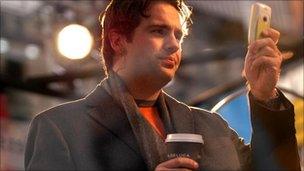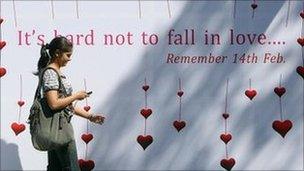Love on the go? There's an app for that
- Published

New services hope that showing those who are nearby will lead to more people meeting up
Chances are, that if you were trying to find a date 15 years ago, you would have to be in the same place at the same time.
Internet dating changed all that, with users researching and contacting a potential date before meeting; turning the lonely hearts column into a billion-dollar industry. Over 17% of single internet users have used dating websites according to one recent US survey, external.
But the increase of GPS-enabled smartphones has made online dating much more practical and immediate.
A number of apps allow users to see potential partners nearby with a username, photograph and selected details about them. They can then contact each other and arrange to meet in a matter of minutes.
"I think everyone struggles to meet people," says Joel Simkhai, CEO of newly-launched app Blendr, promising to make social networks social again.
"We're not re-inventing the wheel here, we're just facilitating a connection that happens a million times a day."
And it does seem like there is a desire to meet people online in the hope that love could be, quite literally, around the corner.
Skout, another app available on both iOS and Android platforms, promises users can "flirt, chat, maybe even find a date" by using its GPS-enabled service. Currently the most widely-used app of its kind, it has seven million people signed up, with a 60% to 40% split between men and women.
'Sexual promiscuity'
Simkhai has previous experience with GPS dating. He is the man behind Grindr, an app targeted at the gay community. With over 2.6 million users - over 100,000 of whom are in London - it is said to be responsible for changing the way gay men meet through the internet.

Dating services have been trying to harness the power of mobile for a number of years
But the service has received criticism for apparently being designed to facilitate casual - often very brief - liaisons. Critics say, external sites like Grindr promote sexual promiscuity and are "likely to chip away at the norm and practice of monogamy".
Simkhai says the situation is more complex. "One of the main reasons people go to Grindr is actually for friendships," he says, adding that the platform is neutral and only makes it easier to meet people. It is up to them what they do with it.
And with his new app Blendr, he is keen to distance himself from the idea of an app used just to meet people for sex, even though membership is limited to people over the age of 18.
"I think there'll be all kinds of relationships," says Simkhai.
"Women and men will use it in all types of ways. I think it's going to be different things for different people."
He says the new app will carry information on hobbies and interests and is geared as much for a straight, married man looking for a poker partner or a woman looking for a tennis team-mate as anything more intimate.
But will women want to use it for casual dating?
"A lot of women don't want to reveal their availability too quickly," says dating guru James Preece.
"These sort of sites take away the mystery. You open yourself up to a lot of strangers and weirdos."
Safety concerns
Conventional dating sites are also getting in on the game - combining dating profiles with GPS services.
OKCupid, with its database of eight million members, has recently launched a "Locals" service promising the same matchmaking service that it traditionally offers, with an added layer of who is nearby at any moment.
"I hold Grindr up as a model of success. I'm not disparaging them," OKCupid CEO Sam Yagan told BetaBeat., external
"But their reputation [of being more about casual relationships] and their name in many ways is about something that I think the majority of straight women don't want."
Beyond what women are looking for from a date, others believe that safety concerns could make many, especially women, wary of using the service.

More and more people are looking for love on the go by using their phones to contact potential dates
There has been much written about the risk of giving away exact GPS locations - even when using check-in applications like Foursquare, GoWalla or new features on Facebook - but most GPS dating sites are keen to stress that they only show how far away someone is. Typically, users are also given control over how precisely their location is displayed.
But some believe the older problem of hidden identities and false information being given online is still a big problem.
"There's a big perception that when you meet people on the internet, they are not always who they say they are, that's a really big concern," says Louise Ward, features editor of women's weekly More! magazine.
"Even when we talk to [young women] about conventional dating sites, the one thing that puts them off is that people can create false profiles, they're really worried that they meet someone dangerous.
"Although dating is changing and people do meet over social networks, it's going to take a little bit longer for something like this to become the norm."
And perhaps the most important thing is there is still the age-old problem of actually being charming when two people actually arrange a date in real life.
"A lot of men will download these apps in the hope it will increase their chances of meeting women," says Preece.
"But if they are shy and can't approach them in the first place, it isn't going to make life any easier once they've met."